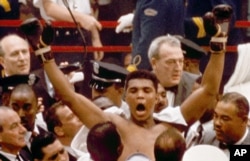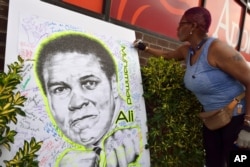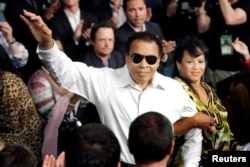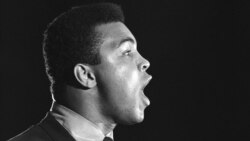Thousands continue pouring to the makeshift memorial at the Muhammad Ali Center in Louisville, Kentucky, to pay their last respects to the famed professional American boxer, Muhammad Ali, who died on Friday.
“They’ve been thousands upon thousands of people that have left flowers, cards, t-shirts, boxing gloves, and kids have drawn pictures,” said Donald Lassere, president and chief executive of the Muhammad Ali Center. “All in grievance and respect and remembrance of Muhammad Ali.”
Born Cassius Marcellus Clay, Muhammad Ali took the boxing world by storm, winning 56 of his 61 fights around the world, the majority by a knock out.
Lassere, who’ been running the Center since 2012, said the Center, founded by Muhammad Ali and his fourth wife, Lonnie, was not intended to be a boxing museum.
“What Muhammad and Lonnie wanted to do with the center is not to have a boxing museum,” he said. “They wanted a center to inspire people and as Muhammad has inspired people.”
Lassere explained that the center is partitioned in such a way so as to reflect six principles by which Muhammad Ali lived by, namely, Confidence, Conviction, Dedication, Giving, Respect and Spirituality, and the stages he went through in his life, such as when he refused to enlist to fight in the Vietnam War.
“For example, when you go into our Conviction Pavillion, you’ll see its almost like a walk through history where you will see how tumultuous America was at the time Muhammad made his conscientious objection to being inducted into the military,” said Lassere.
“In that Pavillion you will see there were a lot of people who objected to his stance on the Vietman War. But you will also see video of Muhammad converting to Islam, he was becoming a Muslim, and he was free to make that choice. And he said, 'I don’t have to be what you want me to be, I am free to be who I want to be'.”
Apart from the title of heavyweight champion, many referred to Muhammad Ali by the title “The Greatest” as he often called himself. But Lassere said that title was not far from the truth.
“When you were in the presence of Muhammad, you were in the presence of greatness, true greatness,” he said.
Despite the onset of Parkinson’s which gravely diminished his mobility and ability to speak as he used to, Lassere said Muhammad Ali remained an engaging communicator.
“Muhammad could say more with his eyes that I could say with a thousand words quite frankly, and with his facial expressions and his body language, so he was still a very, very expressive person” explained Lassere. “It was his mere charisma, I meant that never left him, and the fact that he loved people and people loved him, that never left. And so while he wasn’t speaking much, he still was able to communicate.”
Lassere describes with a laugh his reaction to meeting Ali.
“His eyes were so expressive, his facial expression can bring a smile to your face, and that is what it did to me, I was just in awe of meeting him and so honored to meet him.”
While revered by many, Muhammad Ali did not always gain the love of his opponents, many of who he shredded to bits with words leading to a crucial match.
Lassere said what many may have described as arrogance, Ali was simply living by one of his principles – confidence.
“He was always very, very confident, and yes, of course, I am sure it was off putting to his opponents, and many of them said so,” acknowledged Lassere. “But Muhammad was always confident and he had a strong belief in his ability as a boxer and so, you talk to any boxer, they would not go into a ring thinking they are going to lose, and Muhammad always went in and he knew he was going to win.”
Though Muhammad Ali has now passed on, Lassere said the Center will continue to tell the world about his life. He said that was one of Muhammad Ali’s wishes.
“One of Muhammad’s wishes is in lieu flowers for example, in lieu of flowers and cards, that people make donations to the Center to make sure that we continue with his legacy. And so that is what we are going to do," Lassere said.
Muhammad Ali will be laid to rest in his home city of Louisville, Kentucky, Friday, and in keeping with Muhammad Ali’s wishes, the memorial will be open to the public.










